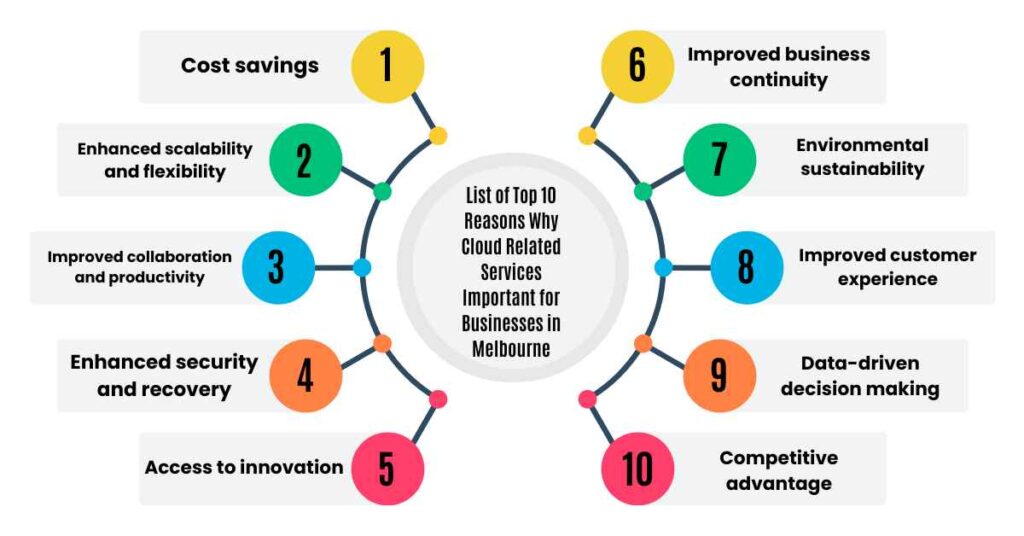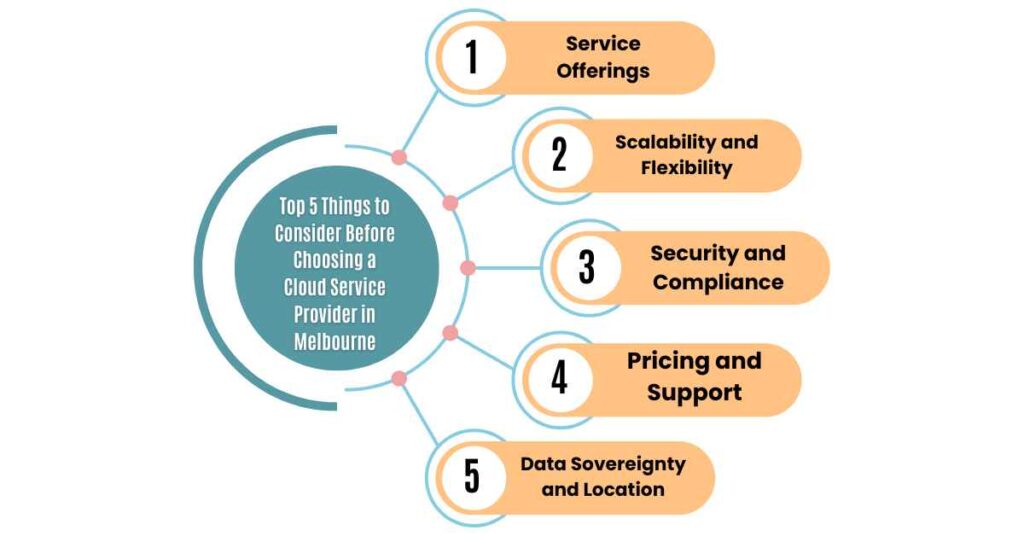Amid this fast-changing digital world, cloud-related services have become a critical success factor for businesses in Melbourne just as they have around the globe.
Cloud computing has a profound impact on the potential to transform; it is a multi-benefit scenario that can significantly influence a company’s bottom line. From cost-effectiveness and scalability to enhanced agility and improved collaboration, embracing cloud solutions is no longer an option, but a necessity for businesses to thrive in this modern market.
This blog deeply looks into the Top 10 Reasons Why Cloud Related Services Are Important for Businesses in Melbourne, major advantages, and leading providers of the region.
List of Top 10 Reasons Why Cloud Related Services Important for Businesses in Melbourne

1. Cost savings
Cloud computing has reduced the costs of IT infrastructure by minimizing expensive on-premises hardware such as servers and also storage and networking devices. This eliminates the immediate capital expenditure involved in purchasing and maintaining this infrastructure.
Additionally, the cloud has a pay-as-you-go service model, enabling businesses to only pay for what they consume; this thus saves IT expenditures and prevents unnecessary spending in aspects that do not lead to revenue generation.
This flexibility allows businesses to scale resources up or down based on their fluctuating demands, thus only paying for the computing power they require at any given time.
2. Enhanced scalability and flexibility
Cloud computing gives businesses unmatched scalability and flexibility.
It is not possible to scale up or down on-premises infrastructure easily or quickly, as this can be cumbersome and time-consuming. Cloud services allow for easy scaling of resources up or down to meet the changing needs of a business. This agility is important for companies that are experiencing rapid growth, seasonal fluctuations in demand, or unexpected surges in traffic.
With seamless alteration of resources, businesses can function at optimal capacity, avoid bottlenecks, and capitalize on emerging opportunities without infrastructure constraints. Moreover, the freedom to alter infrastructure allows businesses to quickly respond to changes in markets and unforeseen challenges.
3. Improved collaboration and productivity
Cloud computing revolutionizes collaboration and boosts productivity in an organization. Through the remote accessibility of data and applications from any location with access to the internet, cloud services break down the geographical barriers of collaboration.
Therefore, employees can work effectively irrespective of their location; this enhances communication and shortens project timelines. Cloud-based tools and platforms have streamlined workflows and automated tasks as well as helped in the easy sharing of data that was cumbersome for manual processes.
This efficiency and streamlined operations make the employees focus on more important jobs, leading to overall productive growth and increased business.
4. Enhanced security and recovery
Cloud providers significantly invest in the latest security infrastructure and utilize the most effective security practices to protect sensitive data from cyber threats.
This includes strong measures such as data encryption, access controls, and regular security audits, ensuring that the data remains secure and confidential. Moreover, disaster recovery capability is enhanced through cloud computing. Built-in redundancy and replication of data at multiple data centers minimize the loss of data in case of disasters such as floods, hardware failure, or other cyberattacks.
This business continuity with little disruption of critical operations panacea for valuable data and continued business operations even in unforeseen challenges.
5. Access to innovation
The cutting-edge technologies of the cloud provide unparalleled access, which is quite a booster of innovation and takes businesses to greater heights. These advanced technologies that are provided on cloud platforms range from AI to ML, big data analytics, and IoT.
With the usage of these technologies, a business can get better insights from the data, automate tasks, enhance decision-making processes, and build innovative new products and services. This gives businesses the edge to stay ahead of the curve, gain a competitive advantage, and thrive in today’s rapidly evolving digital landscape.
6. Improved business continuity
Cloud computing will ensure business continuity as it removes single points of failure such as on-premises hardware and data centers and instead improves resiliency, thus reducing the chances of business downtime. Should a piece of hardware fail or the power supply is interrupted for whatever reason, business operations should not be compromised.
Cloud services should be allowed to continue operation so that interruption of critical services does not disturb the customers’ satisfaction. This improved business continuity is essential for keeping up a strong competitive position and being successful in the long run.
7. Environmental sustainability
Cloud computing contributes to environmental sustainability because it optimizes energy consumption and reduces the environmental impact of IT operations. For instance, many cloud providers are using highly efficient data centers equipped with advanced cooling systems and renewable energy sources to minimize their carbon footprint.
Because cloud computing concentrates IT infrastructure into centralized data centers, it avoids the need for many smaller, less efficient on-premises data centers that consume more energy and have a higher environmental impact.
This commitment to sustainability fits in with a rapidly growing global discussion about environmental responsibility and is evidence of commitment to a greener future.
8. Improved customer experience
Many ways cloud computing helps businesses improve the experience of their customers include faster new applications and service deployment.
This means that businesses can act promptly to meet changing customer demands and to introduce such innovations into the market. It enhances customer interactions through cloud-based customer relationship management systems and contact centers that enable businesses to deliver customized, efficient support.
Additionally, cloud-based analytics platforms provide insight into customer behavior so that businesses can tailor their offerings to the specific needs and preferences of their target audience.
9. Data-driven decision making
Cloud computing happens to be a strong platform for data-driven decision-making. Leverage cloud-based data analytics and business intelligence tools, and businesses can make valuable insights from these heaps of data that one would come to identify trends and even make informed decisions, optimizing operations, improving marketing campaigns, and now even identifying new business opportunities.
The power of data will help businesses understand customers, market trends, and their competitive landscape so that they can make informed and strategic decisions.
10. Competitive advantage
Cloud computing, in essence, offers businesses a strategic advantage in a dynamic market.
Efficiency, scalability, and innovation enabled by cloud services open up avenues for business process optimization and more cost-effective operations, allowing businesses to lead the race in various markets before others can compete on equal footing.
Cloud computing enables businesses to become agile and responsive and, therefore, innovative, as they better adapt to dynamic market landscapes and outstrip competitors in the race toward long-term success.
Top 5 Things to Consider Before Choosing a Cloud Service Provider in Melbourne

1. Service Offerings
Each service provider’s respective offerings should also be carefully matched against your business requirement and if IaaS, PaaS, SaaS, Managed Services, and related security offerings are needed.
2. Scalability and Flexibility
Select a provider that can adapt to the changing needs of your business and scale resources up or down as needed.
3. Security and Compliance
Prioritize vendors with robust security measures and compliance certifications to protect your sensitive data.
4. Pricing and Support
Review the different pricing models: pay-as-you-go, subscription, and reserved instances. Analyze customer support quality, along with access to technical help.
5. Data Sovereignty and Location
If residency of data is a key requirement, select an organization whose data centers are within Australia to respect the local legal requirements.
Conclusion
Cloud-related services are no longer a luxury but a necessity for businesses in Melbourne to remain competitive and innovative. Businesses can leverage the power of the cloud to enhance agility, reduce costs, improve efficiency, and unlock new growth opportunities.
Achieving these benefits, however, depends on the proper choice of cloud service provider. Businesses can then choose a partner that suits their needs and will help them achieve success in the digital age by carefully considering the service offerings, scalability, security, pricing, and support offered by the service provider.
Frequently Asked Questions
Q. What are the advantages of using cloud services for Melbourne businesses?
Ans. There are a wide range of advantages of cloud services for businesses in Melbourne. To begin with, they greatly save on IT infrastructure costs since businesses no longer need to incur costs associated with costly on-premises hardware and software.
The pay-as-you-go model becomes applicable whereby resources are only paid for, ensuring optimal spending and saving from wastefulness. Cloud services can scale and offer flexibility, enabling businesses to scale up or down according to fluctuating demands, which is particularly important for companies experiencing growth spurts or volatile market conditions.
Thirdly, cloud computing helps improve collaboration and productivity by giving people remote access to data and applications, ensuring seamless teamwork and streamlined workflows.
Q. What are the available cloud computing models?
Ans. There exist three primary forms of cloud computing models: IaaS, PaaS, and SaaS. There are three types. 1. IaaS will provide fundamental computing resources 2; that is to say, in terms of servers, storage, networking, and allowing users to develop and deploy applications.
PaaS provides a fully featured platform where one can design, run, and manage applications with no need to build and manage the underlying infrastructure. SaaS delivers applications over the internet on a subscription basis, eliminating the need for local installation and maintenance.
Each model caters to different needs and preferences, allowing businesses to choose the most suitable option for their specific requirements.
Q. What are the security concerns when utilizing cloud services?
Ans. Security is of prime importance while using cloud services.
There should be robust security to prevent unauthorized access and cyber-attacks on sensitive data. Encryption is a must-have for both data in transit and at rest to ensure protection. Access control in the form of multi-factor authentication and role-based access control needs to be strong to restrict access to sensitive data and avoid unauthorized access.
The importance of regular security audits and penetration testing are also necessary to detect and correct possible vulnerabilities. Selecting a reliable cloud provider that has a history of security and compliance is essential to ensure that your data will be safe and sound.
Q. How do companies in Melbourne implement a seamless migration to the cloud?
Ans. A smooth transition to the cloud is all about strategy. First, an organization should set up a thorough cloud strategy. This should explain their objectives and identify the primary use cases of the organization while choosing the appropriate cloud model.
The organization’s existing IT infrastructure needs to be evaluated for the possibility of moving it to the cloud and areas of difficulty. A proper migration plan should include data migration, application testing, and user training. Therefore, it is important to select a trusted cloud service provider with experience in cloud migration and implementation to ensure a smooth transition.
Q. What are the future trends in cloud computing for businesses in Melbourne?
Ans. The future of cloud computing is full of promise for businesses in Melbourne. Edge computing, which processes data closer to the source, will be widely adopted, reducing latency and improving performance for applications with real-time requirements.
Serverless computing, which enables running applications without managing servers, will simplify development and reduce operational overhead. Artificial intelligence (AI) and machine learning (ML) are going to increasingly integrate with cloud services.
Such integration will give businesses greater data insights, automate more work, and help make better decisions. Another emphasis will be put on sustainability by cloud providers with more eco-friendly practices and products that promote a greener future.




